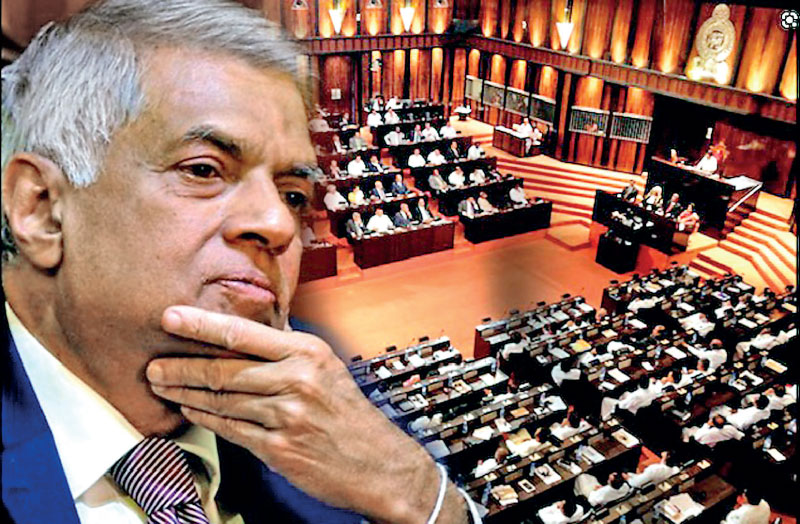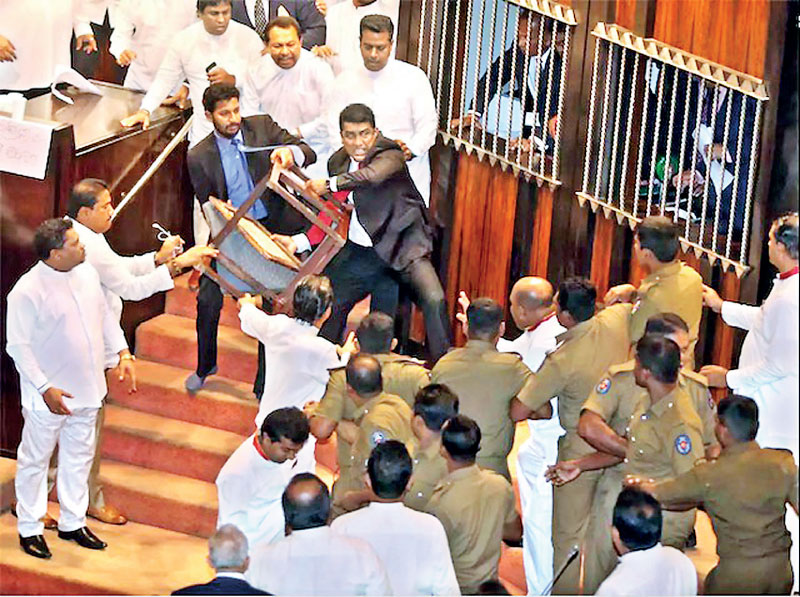Sunday Feb 15, 2026
Sunday Feb 15, 2026
Thursday, 8 September 2022 00:10 - - {{hitsCtrl.values.hits}}

Sri Lanka must have an ‘intellectual culture’ based on debate and accountability

 Given the shocks that a country is faced with today, we see that parliaments which are intellectually strong tend to be better equipped to manage situations; that is the lesson that emerges globally.
Given the shocks that a country is faced with today, we see that parliaments which are intellectually strong tend to be better equipped to manage situations; that is the lesson that emerges globally.
Letter from Parliament
In my column when I had mentioned that over 80% are qualified with an Ordinary Level or below in Sri Lanka, a letter intimating that 87% of Sri Lanka’s Parliament being equipped with a PhD, Degree, Diploma and GCE Advanced Level was received, signed by the Director Legislative Services/Director Communication (Acting) – Parliament of Sri Lanka.
I was pleasantly surprised that one would go to read an article in such depth and it had been followed up on its content. I will be failing in my duty if I don’t ‘acknowledge’ the spirit of the letter and want to correct the perception people have of Sri Lanka. This is the reform Sri Lanka needs and we must also support such initiatives.
Best brains
If I track back on my engagement with the public sector in the last 15 years where I have served on numerous occasions as the Chairman of key institutions in exports, tourism and economic development, my key observation on the public sector is that the quality is very strong on depth of thinking and strategy.
The logic is simple – unless someone has a top level degree from a State university, one cannot get picked up to the Government service. So obviously, my observation on the public sector makes sense. If I dig deeper, their passion and commitment towards work is also very strong. But I do agree that on the attribute ‘business sense’ there is progress that one can make.
The question arises, how come with such strong talent, how can Sri Lanka have made such bad decisions that has made the country go bankrupt. It’s the first time in South Asia and the only country in our part of the world in the last 50 years.
Where did we go wrong?
It’s important that we do a soul search to understand how the lives of the 22 million people who pay for the salaries of the public sector and MPs in Parliament by way of the taxes we are levied can end with this outcome. Let’s accept it, the last six months has been torture to the 22 million people – power cuts of over 12 hours, people having to stay on petrol queues for days resulting many losing their lives, the shortage in medicines, public transport coming to a standstill and the last straw in the coffin – inflation hitting 90% plus.
How come we end up with such a disastrous performance if we say that we have the best brains in the public sector backed by 87% - PhD, Degree, Diploma and GCE Advanced Level qualified in Parliament? Where did Sri Lanka go wrong? What is the lesson to the world?
Bad decisions
Before we go further, let’s identify the key bad decisions made in the last two years so that we remove the ‘facts’ from the perceptions.
The first mistake was the implementation of the election promise on taxation without understanding the ramification of the decision. In fact I would say it was the biggest blunder made where an unsolicited tax concession to income tax and VAT payers was made that cost the country Rs. 6 billion. Many top policymakers advised the Government not to pursue this initiative but the decision was approved. The decision led to the country ratings being pegged down and finally we lost the ability of raising money from the international market. The Government revenue to GDP crashed to an all-time low of 8%.
The second decision that took Sri Lanka to the wire was the artificial peg of the Sri Lanka rupee at Rs. 200 per dollar. Even though IMF had suggested a planned float, Sri Lanka went on to pursue the dirty float and burnt out almost $ 2 billion. Foreign reserves crashed from $ 7.6 billion in December 2019 to $ 20 million as at end July 2020 (usable money).
The third key mistake made was the wild float of the rupee. It was done without advice from the Monetary Board or following basic guidelines that one must follow in the country's economic management with strategies like sequencing. The Central Bank Governor repeatedly mentioned that his road map was on track which was a blatant lie until the system totally collapsed.
The fourth decision that killed Sri Lanka was the blatant decision of the President to ban the use of chemical fertiliser. This was against the fundamentals of good agricultural policy where phasing out of the decision should have been done. 32 agricultural experts had met the President but with absolute arrogance the decision was kept on force that ultimately led to paddy farmers revolting and the loss of production by almost 45% and tea production declining by 30%.
The fifth mistake was the delay in the country not seeking IMF support and seeing the country through as early as 2020. Once again many top economic experts advised the Government from early 2020 but the policy statement was ‘Sri Lanka will pursue a home grown solution’.
It’s tough to come to terms on how the 87% PhD, Degree, Diploma and GCE Advanced Level qualified Members of Parliament together with the strong public sector officials could have allowed this to slip. Sri Lanka is now a pariah state financially rated as ‘Default’. A country cannot get any lower in the global stage.
Lesson from India
It’s important to identify the cause of this situation. Was it a leadership flaw or was it a process breakdown must be identified. If not, history will repeat itself once again in another hundred years’ time. We must not allow this to happen.
Let’s look at an economy that has faced a similar issue in the recent past in our part of the world – India. There were three reasons for the quick turnaround. The Indian civil service is very strong systematically and hence the political hierarchy could not influence the process. The system took over and actioned the next steps. Individuals could not influence the system. The second being that once a leader fails, they accept the mistake and resign for a better person to take the role. In this case a person with a strong economic background took the leadership position. The third being that the ‘legal system’ was very strong where independence of the judiciary is upheld at all times.
Sri Lanka does not have to invent the wheel. If we can bring to life the three lessons from India, there is no doubt Sri Lanka can be the Miracle of Asia.
Best thing for Sri Lanka
Whilst many can lament on the current state of the country, in my view it’s the best thing that could have happened to Sri Lanka. We have no options but to put the basics right.
IMF stipulates that corruption has to be addressed and a costs based economic model must come to shape. Subsidies must be removed. Government revenue must be increased so that printing of money will have to stop. There has to be a strong drive on exports and tourism whilst the bloated public sector must be rationalised.
In simple words a political economy will have to come to an end. Sri Lanka must become a market driven economy. Let’s support the country.
(The thoughts are strictly the personal views of the writer and not the views of organisations he is attached to in Sri Lanka or South Asia.)